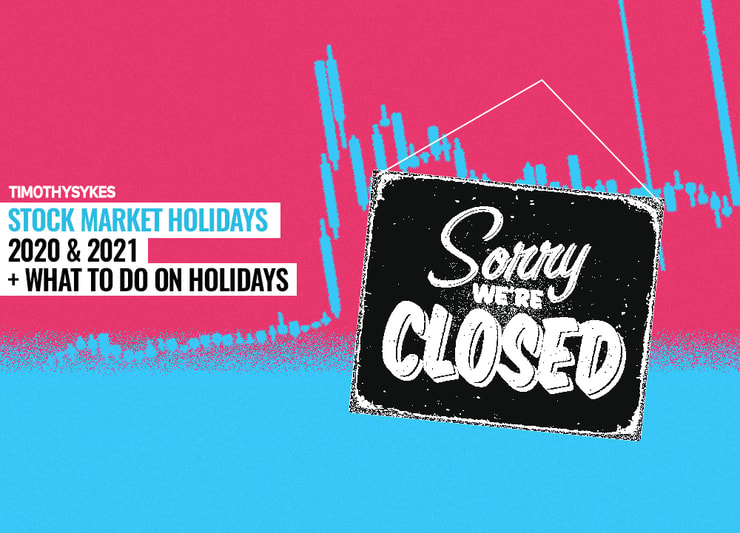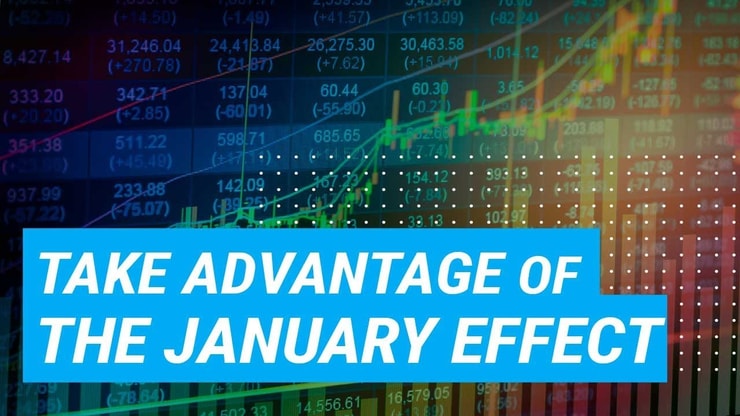You may not be able to execute trades on stock market holidays, but that doesn’t mean you need to hit the pause button on your trading career.
Do you remember the tagline from the “Wall Street” movie sequel? “Money Never Sleeps.” Opportunities arise all the time, and events are in the works that can move the market even when it’s closed.
So even when the market is closed, there’s still plenty you can do to ensure that you have a leg up on trading opportunities.
By making the most of these quiet times in the market, you can be extra prepared when the market reopens … and ready to pounce on the most promising stocks.
Need some direction? Here’s what to do on a stock market holiday…
Table of Contents
What Are Stock Market Holidays?

No big reveal here: a stock market holiday is just what it sounds like. It’s a day that the stock market is closed for the day.
In the U.S., this aligns with several major national and international holidays. Some are pretty obvious, like Thanksgiving Day and Christmas Day.
However, there are some that might surprise you, like George Washington’s birthday or Labor Day.
Occasionally, other events will cause unexpected closures. For example, when a former U.S. president dies, the stock market may be closed as a show of respect. While closures like this will be announced, you typically don’t get much notice.
Stock market holidays are different from seasons in the stock market. For example, many consider August a ‘holiday’ month in the stock market. That’s because it’s traditionally pretty slow due to many people taking vacations during this time. However, the market’s still open.
2020 Stock Market Holidays
Here’s a list of stock market holidays in 2020. For a full list of holidays when the stock market is closed, check out the NYSE holidays page.
- Wednesday, January 1: New Years Day
- Monday, January 20: Martin Luther King, Jr. Day
- Monday, February 17: Markets closed for Washington’s Birthday
- Friday, April 10: Good Friday
- Monday, May 25: Markets closed for Memorial Day
- Friday, July 3: 4th of July (observed)
- Monday, September 7: Labor Day
- Thursday, November 26: Markets will be closed for Thanksgiving Day
- Friday, November 27: Markets close at 1 p.m.
- Thursday, December 24: On the day before Christmas Day, the markets will close early, at 1 p.m.
- Friday, December 25: Markets will be closed for Christmas Day
2021 Stock Market Holidays
If you want to mark your calendar for the year ahead, here are the stock market holidays in 2021:
- Friday, January 1: New Years Day
- Monday, January 18: Martin Luther King, Jr. Day
- Monday, February 15: Markets closed for Washington’s Birthday
- Friday, April 2: Good Friday
- Monday, May 31: Markets closed for Memorial Day
- Monday, July 5: 4th of July (observed)
- Monday, September 6: Labor Day
- Thursday, November 25: Markets will be closed for Thanksgiving Day
- Friday, November 26: Markets close at 1 p.m.
- Friday, December 24: Christmas Day (observed)
Worldwide Stock Market Holidays
Not every stock exchange has the same opening hours or holidays.
For example, while the markets in the U.S. don’t have any holiday closures in October, the Indian Stock Exchange is closed on October 2 for Mahatma Gandhi’s birthday.
And on October 14, the Tokyo Stock Exchange is closed for something called Health-Sports Day (who knew?).
You can find a full list of global market holidays on the New York Times website.
What to Do on Stock Market Holidays

No, the point of this post isn’t to tell you that you shouldn’t enjoy time off with family or friends on holidays.
However, I do want to point something out if you’re a trader with limited time (for example, if you have a full-time job). Stock market holidays that coincide with days off from work can offer you some much-needed time to get ahead on things like studying and stock market research.
Want to be prepared and ready to go when the market re-opens? Here are some great ideas for what you can do when the market is closed…
More Breaking News
- Denison Mines Stock Surge Amid Strategic Developments
- QuantumScape Takes a Big Leap with New Battery Line
- Valterra Platinum Strengthens Position with Impressive Earnings Surge
- Bitfarms Plans for U.S. Redomiciliation and Debt Repayment Spark Investor Interest
Weed Your Watchlist
Your watchlist is like a garden: to help it thrive, it’s necessary to remove the dead leaves and debris every now and again.
A stock market holiday is a perfect time to weed your watchlist and ditch the snoozy stocks.
Don’t get scared by FOMO. If you watch a stock for a while and it’s not moving, it may be time to cut it from your list.
Sure, it’s possible that a stock could explode the day after you remove it from your watchlist. But that’s a risk you run with any stock. There will always be more opportunities.
And if you use smart tools like StocksToTrade’s built-scans and Breaking News Chat, you’ll likely see that stock pop up again.
(Quick disclaimer: I helped design and develop StocksToTrade.)
Plan and Research
Once you cut some dead weight off of your watchlist, focus on the stocks that still seem promising.
Get a little more detailed with your research. If any of the stocks seem like they could be real contenders, spend a little time making plans for potential trades.
This means setting up a sort of ‘if/then’ scenario for the stocks. Figure out potential entry and exit points that would make the trade worthwhile for you. A little planning and research can help prepare you so you’ll be ready to pounce if the stock meets your criteria.
Review Your Trading Journal
You keep a trading journal … right? If not, start today or the next time you have a long holiday weekend. It’s worth it.
By reviewing your trading journal, you can get a snapshot of your performance and continue to improve.
Go back to your trading journal and take stock of your recent trades. Chances are, with a little distance from them, you may see some trends emerging. You can better spot which setups are working … and which setups consistently result in losing trades.
Once you can identify these personal patterns, you can quit wasting your time with the setups that don’t work for you. Wouldn’t you rather focus on the setups that work? Devote some time to figuring that out. The truth just may surprise you.
Many of my top students do this to keep improving. Why not be like those traders?
Get Inspired
Are you falling behind on what’s going on with other successful traders? Use this time to check out social media feeds, videos, and Profit.ly posts by successful traders.
You can check out my regularly updated YouTube videos to learn more about the market right now and my commentary on my personal trades. Time away from the market can be well spent catching up on timely trading topics and lessons.
Get back in touch with the pulse of the market. It can give you some great ideas for your own trades.
Educate Yourself
Feel like binge-watching Netflix? Here’s what I think: Skip it if you want to be a better trader. Pop some corn and binge-watch my “How to Make Millions” instead! (All proceeds from the sale go to charity.)
OK, I’m not a monster. At least watch some trading videos BEFORE you start streaming the latest sensation or go down the YouTube wormhole.
Stock market holidays are a great time to revisit trading basics. Need a few ideas? You can read my book “An American Hedge Fund” (it’s FREE). Or you can listen to a trading podcast or two. And you can browse my library of DVDs. These are all great ways to make use of quiet time to improve your knowledge base.
Check out Other Markets
Just because it’s a stock market holiday in the U.S. doesn’t mean it is everywhere in the world.
Even if you don’t trade in the overseas markets, you can still gain some valuable insight into the global economy by checking them out. You could also get ideas for trending sectors or sympathy plays.
Additionally, you can make forex and crypto trades even when the stock market is closed. So if these modes of trading appeal to you — and you know what you’re doing — it’s still possible to execute trades.
Update Yourself on World Events
Again, the world doesn’t stop moving just because there’s a holiday in your neck of the woods. If you’ve fallen behind on current events, use a market holiday as an opportunity to catch up.
Remember: it’s all connected. Events that move the economy can also move the market. There can be huge value in staying up to date on what’s going on in the world.
Get Ready for Tomorrow
Are you chomping at the bit to trade the moment the market bell rings in the morning? You won’t be alone.
While the day before holidays is typically slow in the market, the day after a holiday is typically a high energy day of trading. Make sure you’re prepped and ready to go!
Have your trading plans ready, set up tabs for all the stocks you’re watching on StocksToTrade, and get a good night’s sleep. Be ready to wake up early and get to work when the market opens!
Frequently Asked Questions About Stock Market Holidays

Now, let’s get to a list of frequently asked questions I get about market holidays…
Is the Stock Market Open 24 Hours?
The U.S. major exchanges aren’t open 24 hours a day. You can place trades in premarket and after-hours trading, but be careful. There’s less liquidity. Crypto and forex trade 24 hours a day. But volume will be lower on weekends when most traders take time off.
How Many Days Will the Stock Market Be Closed?
The market is usually only closed for three consecutive days, on long weekends. However, big world news, like the 9/11 attacks, can close the market for a longer period. There can also be temporary trading halts if the markets experience too much volatility, but those are usually shorter than a day.
Is the Stock Market Open on Weekends?
No, the major U.S. exchanges aren’t open on weekends or holidays. Almost all the major exchanges around the world will be closed on major holidays.
What Are the Bond Market Holidays in 2021?
Bond markets have more holidays than regular exchanges. The bond markets are closed on the same holidays as the major exchanges. They’re also closed on Columbus Day, October 12, 2020, and Veterans Day, November 11, 2020. The bond markets also close early (at 2 p.m. Eastern) the day before six of the major annual holidays.
Trading Challenge
When I started my trading career, there weren’t any day trading classes. I had to learn things the hard way, and I made plenty of mistakes along the way.
You can read about my trading journey in my no-cost book, “An American Hedge Fund.”
I created my Trading Challenge so traders like you can learn from my 20+ years of experience. I want to help you avoid the mistakes I made and make the most of the knowledge I’ve gained over the years.
My focus isn’t just facts and figures. Those change. Instead, I want to help you become a self-sufficient trader. That’s how you can learn to think for yourself and adapt to the ever-changing market.
As my student, you’ll be part of a group of your trading peers who all want to become strong, smart, adaptable, and successful traders. Join them … and become one of them.
In the Challenge, you’ll have some awesome resources — a huge video library, live webinars, live trading sessions, and so much more.
But know this: I’m not scared to lay down the law. I’ll tell you right now that I have zero interest in lazy students. I want dedicated students who are willing to work hard. Are you one of them? Appy today.
Conclusion

Every now and again, the stock market takes a break. But a stock market holiday doesn’t mean that you can’t work to advance your trading career.
By focusing on education and organization during market holidays, you can put yourself in a much better position. That means you can be better prepared to take advantage of opportunities when they arise when the market reopens. So make the most of these quiet times!
What’s your go-to on stock market holidays? Leave a comment with your tips!






Leave a reply